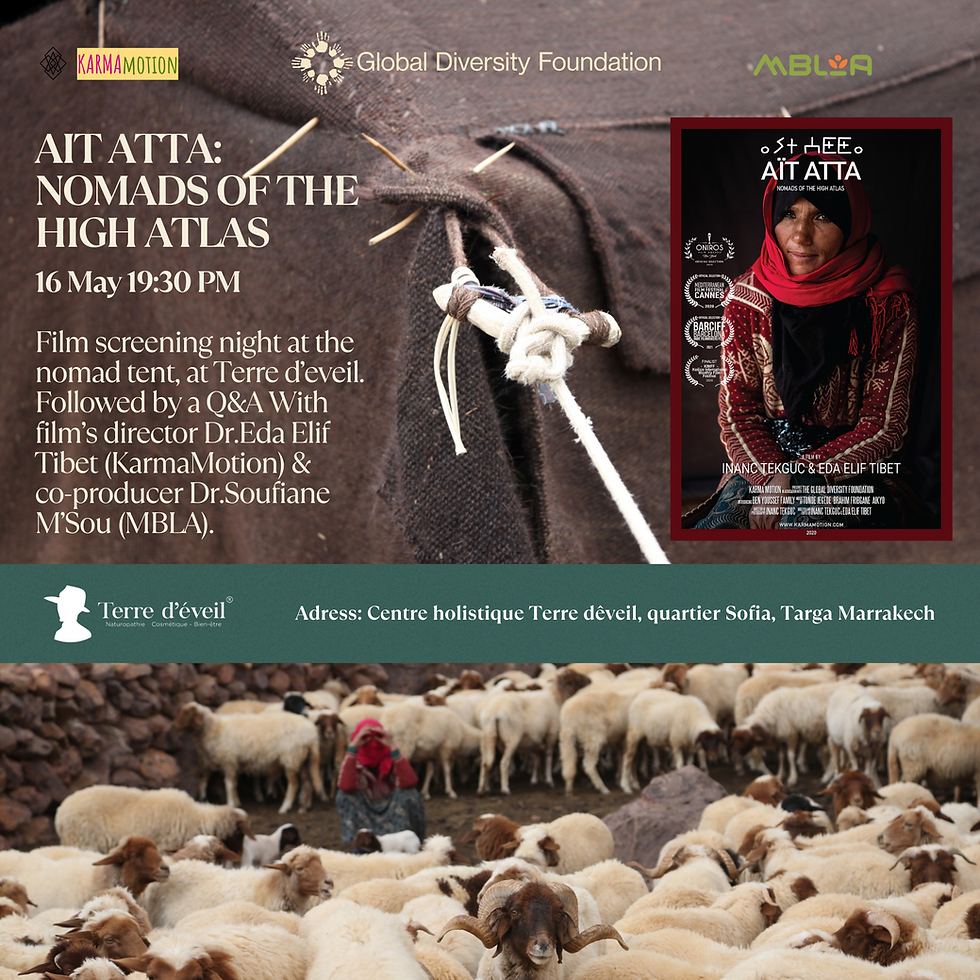JUST TRANSFORMATIONS Panel Highlights From the 18th ISE Congress Marrakech
- Eda Tibet
- Apr 17
- 4 min read
Updated: Apr 23

Rethinking Knowledge: Collective Unlearning
“Where are the Indigenous knowledge holders?”
Asked Prof. Irene Teixidor-Toneu from the French National Research Institute. Picking up this thread, Dr.Eda Elif Tibet, filmmaker and postdoctoral researcher at the Wyss Academy for Nature at the University of Bern, called for a paradigm shift:
“We must facilitate collective unlearning.”
That means stepping outside academic silos, letting go of rigid disciplinary dogmas, and co-creating knowledge with communities, not just about them. This begins by acknowledging and valuing the “invisible knowers” those whose expertise is embedded in lived experience and oral traditions, often marginalized in dominant conservation approaches.
Documenting a Tradition Under Distress
Mr.Ichou Ben Youssef the mobile pastoralist himself, spoke after the screening of Ait Atta: Nomads of the High Atlas (Directed by Inanc Tekguc and Eda Elif Tibet, 2024), took the microphone and said, “Let me do the talking now,” as he shared the urgent needs of his family and tribe and called for support from various stakeholders. The film was shown inside a large nomadic tent at Terre d’Éveil, during a highly attentive evening, organized by the host, Mr.Rachid Jaafari.

“You have conferences where academics come together to share knowledge from all over the world, but why don’t you also include the people you make research together with, by funding their travel and time to these events too?”

Afterward, Ichou met with Hungarian herders, and they exchanged stories and experiences.
This is what was made possible at the 18th International Society of Ethnobiology Congress, which took place in Marrakech in May 2024.
“We made this film because this tradition is rare and vital for biodiversity,” shared Dr.Soufiane M’Sou and Dr.Abdellah Aghraz , executive directors of Moroccan Biodiversity and Livelihood Association (MBLA), in collaboration with Global Diversity Foundation (GDF) and KarmaMotion.
They spoke of the transhumant nomads of the High Atlas, who walk for weeks across Morocco’s rugged landscapes each year. Their ancestral rhythms sustain fragile ecosystems and their displacement threatens not just culture, but biodiversity itself.
Visual storytelling is a powerful tool to preserve endangered knowledge and bring unheard voices into global dialogue.

Indigenous Kinship Systems and Women’s Empowerment
"Did you know that in some regions, land is transferred from mothers to daughters under millennia-old matrilineal systems?"
Highlighted Dr.Timothy Adams, postdoctoral researcher at the University of Bern and University of Oxford.
By recognizing customary land tenure, conservation programs in these areas have not only protected biodiversity but also empowered women as environmental stewards. This is what it looks like when tradition and sustainability walk hand in hand.
Colonial Legacies and Unequal Systems
“Colonial legacies still shape how resources and people are governed. To truly move forward, we need policies that empower, not perpetuate inequality.”
Patrick Knodel, founder of ChanceMaker foundation, underscored the urgent need to dismantle exploitative systems that have historically silenced local voices and to replace them with frameworks grounded in justice and participation.
Systems Thinking and Global Responsibility
Can the EU reduce its energy footprint without transgressing social and environmental boundaries, especially overseas?
This was the critical question posed by Dr.Henri Rueff, head Sustainable Land Systems Impact Area at the Centre for Development and Environment (CDE), University of Bern at our recent panel on Just Transformations, a deeply reflective gathering exploring sustainability, indigenous knowledge, conservation, social entrepreneurship, and EU policy through a truly global lens. Rueff emphasized;
“In an Interconnected world, we must address the telecoupled effects of European consumption and policy on ecosystems and communities far beyond its borders.”
From cocoa farms in West Africa to forests in the Amazon, the ripple effects of Europe’s energy use are not contained within its geography.
Creative Education for Change & Indigenous Solutions with Local Roots
“Change begins with education, but not the top-down kind,” Patrick Knodel added. At the heart of our discussions was the need for creative, grassroots education that ignites curiosity, fosters critical thinking, and encourages collective action. To transform systems, we must inspire people, not indoctrinate them. Education that is rooted in local realities and driven by imagination is key to enabling sustainable, equitable futures. Patrick Knodel stated:
“Solutions must come from the people who live where the problem is”
Our panel echoed this repeatedly: Indigenous and local communities are not mere beneficiaries, they are innovators of context-specific, long-term solutions. Sustainability must also include viable economic models. Without dignity and self-reliance, transformation remains incomplete.
Embodying a New Science of Togetherness
As the panel drew to a close, a shared vision emerged:
“We need to indigenize, not only in word but in action.”
This means building a science of togetherness, rooted in mutual respect, shared purpose, and radical inclusion. It is time to move beyond “big man” approaches and hierarchical structures and create relational, trust-based spaces where multiple ways of knowing are honored equally.

**Video and Photographs by Jeremiah Scott.





Kommentarer